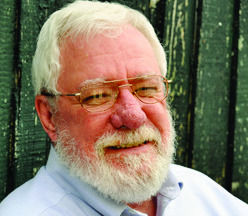Bradshaw
There’s a reason oilfield workers were called roughnecks, but Alba Heywood wasn’t involved in the rough-andtumble of Louisiana’s early oilfields when he got into the gunfight that nearly killed him. He was a comedian who made a name for himself on stages across the country.
According to his obituary in November 1921, Alba “had a natural ability as an Impersonator,” and was the star in a troupe that included his brothers, all of whom later became partners in the Jennings-Heywood Oil Company.
Alba was born in Ashtabula, an Ohio town on Lake Erie, on April 9, 1859, the second of six children of Chester and Clarissa Bannister Heywood. He began his career on the stage as part of the family troupe at the age of 21.
His brother Otho was manager; Clinton played the euphonium, a horn that looked like a small tuba; Dewey was flute soloist; and Scott played the cornet. The group, Alba Heywood and His Peerless Company, toured the country for twenty years before oil lured the brothers away from the stage. An older sister, Clethern, was not part of the troupe.

Bradshaw
Alba was the most peerless of the company, according to a Topeka, Kansas, newspaper that reported, “The impersonations by Alba Heywood … and his imitations of the Edison phonograph and steam calliope were almost perfect.”
Scott Heywood was the first to see the possibilities of the oil business. He was in California when Anthony Lucas drilled the famous gusher at the Spindletop field near Beaumont in 1901. He “came immediately to Beaumont and secured a fifteen-acre lease,” then “wired his brothers … for money to make further [investments],” Alba’s obituary records.
Dewey immediately joined Scott in Beaumont. Alba and Otho invested in the oil venture but stayed for a while longer with the business they knew.
While Scott and Dewey were in Beaumont, one of the partners in a fledgling Jennings oil company visited Spindletop, looking for someone to drill on Prairie Mamou, where natural gas was leaking from the ground. Scott went to Jennings to look things over. That resulted in the formation of the Jennings Oil Company, which contracted with the Heywoods to do the drilling.
The Heywood gusher spouted oil 2,173 feet into the air on May 25, 1901, and the Jennings oil field and a family fortune were firmly established. It’s not clear whether Alba took his show to Jennings because of the well or whether it was just coincidence, but his obituary notes that “it was during the time the first well was being drilled that Alba and O.W. [Otho] … played the town of Jennings.”
Alba eventually joined his brothers and had enough business savvy to become president of their company — which might not have happened if a scrap in Longview, Texas, had turned out differently.
That fracas flared up in March 1898, and newspapers across the country at first reported that the “famous comedian” had been shot dead. According to the El Paso Herald, “The tragedy occurred in the opera house, but no one knew of it until the participants walked several blocks and fell.”
The argument that led to the shooting arose “over the manager of the opera house issuing more complimentary tickets than was mutually agreed upon,” newspapers reported. “When Mr. Heywood [demanded] a settlement … the manager attacked him with a gun, striking him in the face and head and shooting him through the chest.”
The manager, P. T. Pegus, got the worst of it. Heywood had his own gun and “fought for his life, shooting the manager four times — in the groin, head, side, and chest.” The first report was that both men were killed, but neither died.
Alba left the stage shortly after the Jennings field was established. Censuses list him as an actor in 1900, a banker in 1910, and as an oil operator in 1920.
He died in November 1921 in San Benito, Texas, a town near Brownsville that some biographies say he helped to found. That is probably not exactly correct. He was president of the San Benito Land and Water Company and actively promoted its irrigation projects there, but a small town was already established when he formed the company.
He was buried in Greenwood Cemetery in Jennings, eulogized, among other thing as a “unique character” with a “remarkable personality … [and] genial wit,” and as a man who, believing in “the Golden Rule and the Brotherhood of man,” made it “the rule of his life to be of service to someone everyday.”
You can contact Jim Bradshaw at [email protected] or P.O. Box 1121, Washington LA 70589.

